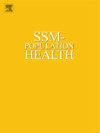加拿大男同性恋、双性恋和其他男男性行为者获得PrEP的不公平:社会指标的网络分析
IF 3.1
2区 医学
Q1 PUBLIC, ENVIRONMENTAL & OCCUPATIONAL HEALTH
引用次数: 0
摘要
本文考察了人口统计、结构和症状变量,以绘制加拿大温哥华、多伦多和蒙特利尔三个最大城市中同性恋、双性恋和其他男男性行为者(GBM)获得暴露前预防(PrEP)的促进因素和障碍。本研究着眼于PrEP级联后期阶段的因素,首先进行了逻辑回归分析并报告了调整后的优势比,然后将统计上显着的社会指标输入网络分析,以描述导致加拿大GBM不公平获取PrEP的相互关联(有时是相互加强)的社会条件。获得对同性恋友好的卫生保健提供者(HCP)的障碍和经济障碍仍然是与不公平获取PrEP相关的主要节点。这两个节点依次与其他社会指标相关:经历HCP的耻辱,不太可能向HCP出柜(最常见于双性恋和酷儿男性),以及无法找到HCP接受他们的性取向(最常见于土著,黑人和其他一些有色人种)。PrEP的费用也是一个障碍,特别是对于受教育程度较低、失业或就业不足的GBM,以及加拿大的新移民,他们往往缺乏药物保险。这些发现表明,有一个初级HCP的重要性,以及找到一个对同性恋和双性恋男性、酷儿和变性人的性行为具有文化能力的HCP的重要性。这些障碍也可以解释黑人、土著和其他有色人种的GBM以及没有覆盖PrEP全部或大部分费用的健康保险的人所经历的其他社会不平等。这种不公平获取PrEP的模式表明,迫切需要提供无经济障碍的普遍获取(目前在加拿大的一些省份提供,但其他省份没有),并支持以欢迎GBM的多样性而享有声誉的获取点。本文章由计算机程序翻译,如有差异,请以英文原文为准。
Inequitable access to PrEP among gay, bisexual, and other men who have sex with men in Canada: A network analysis of social indicators
This paper examines demographic, structural, and syndemic variables to map facilitators and barriers to accessing pre-exposure prophylaxis (PrEP) among gay, bisexual, and other men who have sex with men (GBM) in the three largest cities in Canada, Vancouver, Toronto, and Montreal. Focusing on factors in the later stages of the PrEP cascade, this study first performed a logistic regression analysis and reports adjusted odds ratios, then entered statistically significant social indicators into a network analysis to profile the interrelated and sometimes mutually reinforcing social conditions that shape inequitable access to PrEP among Canadian GBM. Barriers to accessing a gay-friendly health care provider (HCP) and financial barriers remain primary nodes associated with inequitable PrEP access. These two nodes are, in turn, linked to other social indicators: experiencing stigma from an HCP, being less likely to be out to an HCP (most common among bisexual and queer men), and not being able to find an HCP accepting of their sexuality (most common among Indigenous, Black, and some other GBM of colour). The cost of PrEP was also a barrier, especially for less educated and un- or under-employed GBM, as well as newcomers to Canada, who more often lacked insurance for medications. These findings point toward the importance of having a primary HCP and finding an HCP who is culturally competent regarding the sexualities of gay and bisexual men, queer and trans people. These barriers may also explain other social inequities experienced by Black, Indigenous, and other GBM of colour, and by people who do not have health insurance that covers all or most of the cost of PrEP. This pattern of inequitable access to PrEP points toward the urgency of providing universal access without financial barriers (currently available in some Canadian provinces but not others) and supporting access points with a reputation for welcoming GBM in their full diversity.
求助全文
通过发布文献求助,成功后即可免费获取论文全文。
去求助
来源期刊

Ssm-Population Health
PUBLIC, ENVIRONMENTAL & OCCUPATIONAL HEALTH-
CiteScore
6.50
自引率
2.10%
发文量
298
审稿时长
101 days
期刊介绍:
SSM - Population Health. The new online only, open access, peer reviewed journal in all areas relating Social Science research to population health. SSM - Population Health shares the same Editors-in Chief and general approach to manuscripts as its sister journal, Social Science & Medicine. The journal takes a broad approach to the field especially welcoming interdisciplinary papers from across the Social Sciences and allied areas. SSM - Population Health offers an alternative outlet for work which might not be considered, or is classed as ''out of scope'' elsewhere, and prioritizes fast peer review and publication to the benefit of authors and readers. The journal welcomes all types of paper from traditional primary research articles, replication studies, short communications, methodological studies, instrument validation, opinion pieces, literature reviews, etc. SSM - Population Health also offers the opportunity to publish special issues or sections to reflect current interest and research in topical or developing areas. The journal fully supports authors wanting to present their research in an innovative fashion though the use of multimedia formats.
 求助内容:
求助内容: 应助结果提醒方式:
应助结果提醒方式:


